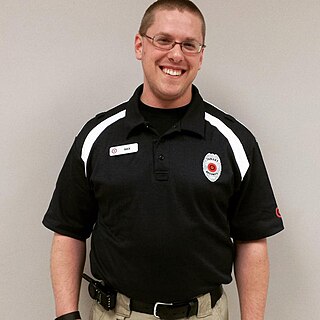Top Qs
Timeline
Chat
Perspective
Store detective
Plainclothes worker in retail loss prevention From Wikipedia, the free encyclopedia
Remove ads
A store detective (also known as Asset Protection Investigator, undercover shopper, Loss Prevention Detective, and Asset Protection Specialist) is a person employed by a company to work for or run a loss prevention or asset protection department. They detect and prevent theft (commonly known as shoplifting), reduce shrink, and manage the security and safety of a store.[1] While in the early days of the profession, store detective were solely employed for theft prevention, in modern times, they are generally in charge of the entire safety, security, auditing, and compliance programs of a store.

Most famously, store detectives detect and prevent theft by using CCTV or patrolling the store in plain clothes to identify members of the public who are stealing from the store. They also work to find ways to reduce operational and internal shrink through process improvement. Some loss prevention employees may be uniformed, although most are plainclothes.
Store detectives are still very common and are used in almost all locations of big-box stores or department stores. Some companies, like Target and Macy's, employ both undercover and uniformed store detectives.
Remove ads
Overview
Summarize
Perspective
Store detectives may be self-employed on a contract basis but most are employees of the retailer, or of a security firm with an outsourcing arrangement with the retailer, or of an agency with a similar agreement.
The job involves patrolling stores in the role of an ordinary shopper, watching for shoplifters. The detective observes any shopper behaving suspiciously and keeps a mental record of such observations. The objective of the store detective is to observe a complete crime taking place. They achieve this by observing a shoplifter approaching an item, appropriating the item (picking it up), concealing the item (not always) and leaving the store having not paid for said item. The key difference between a store detective and a security guard is that the former's role is covert. If they observe an individual shoplifting, they may detain them as they attempt to exit the store or apprehend the suspect(s) during the theft. Laws vary greatly from jurisdiction to jurisdiction regarding what constitutes the crime of shoplifting and how a suspect may be detained/arrested. In Canada, detectives may arrest the individual utilizing powers given to them by the Criminal Code. In the United States, each state has different but similar shopkeeper's privilege laws that allow the arrest and detainment of shoplifters.
It is standard practice that stores require their detectives to have stable work histories and no criminal record. Common backgrounds include the armed services, fire and rescue services, security and policing. In the UK, distance learning courses in store detection are offered by many organizations and the store detective must be in receipt of an SIA (Security Industry Agency) license. Training in security management studies is available from numerous training providers – at various levels. In the US, many states require store detectives to be licensed security officers.
Remove ads
Additional responsibilities
Many retail companies assign the task of investigating check and credit card fraud activity as well as employee theft activity to the store detective. They work closely with law enforcement on such cases whether it is on the local, state or federal level. Companies sometimes also assign the store detective the task of searching employee lockers and bags at random.
Typically store detectives in retail are commonly known either as loss prevention or asset protection. Management and field investigator functions also exist commonly within the loss prevention/asset protection sector of retail.
Remove ads
Techniques and tools of the trade
A store detective has several techniques that they use to detect shoplifters. Keen observational skills is the primary weapon alongside good teamwork with security guards and the use of CCTV. An ability to blend in with other shoppers in a variety of shopping environments is also key. They usually have a clear understanding of the law as it applies to their role depending on jurisdiction.
Most store detectives are unarmed but are trained in arrest and restraint techniques. Some also carry covert microphone and earpieces attached to a radio (sometimes radio-linked to shopping centres and other retail establishments) in order to effectively monitor suspected shoplifters as they move through an area.
In Canada, most Store Detectives are routinely issued slash-proof gloves and handcuffs. However, most provinces require an individual to have special handcuff training and an endorsement on their security license such as in British Columbia.
In popular culture
- The 2012 TruTV reality series Caught Red Handed follows contracted loss prevention officers.
- In the 2021 comedy film Queenpins, Paul Walter Hauser portrays a corporate loss prevention officer for a grocery chain who pursues a pair of women running a coupon scam ring.
- In the 1980 film Stir Crazy, Gene Wilder portrays a store detective who gets fired after falsely accusing a woman of shoplifting.
Remove ads
See also
References
Wikiwand - on
Seamless Wikipedia browsing. On steroids.
Remove ads

